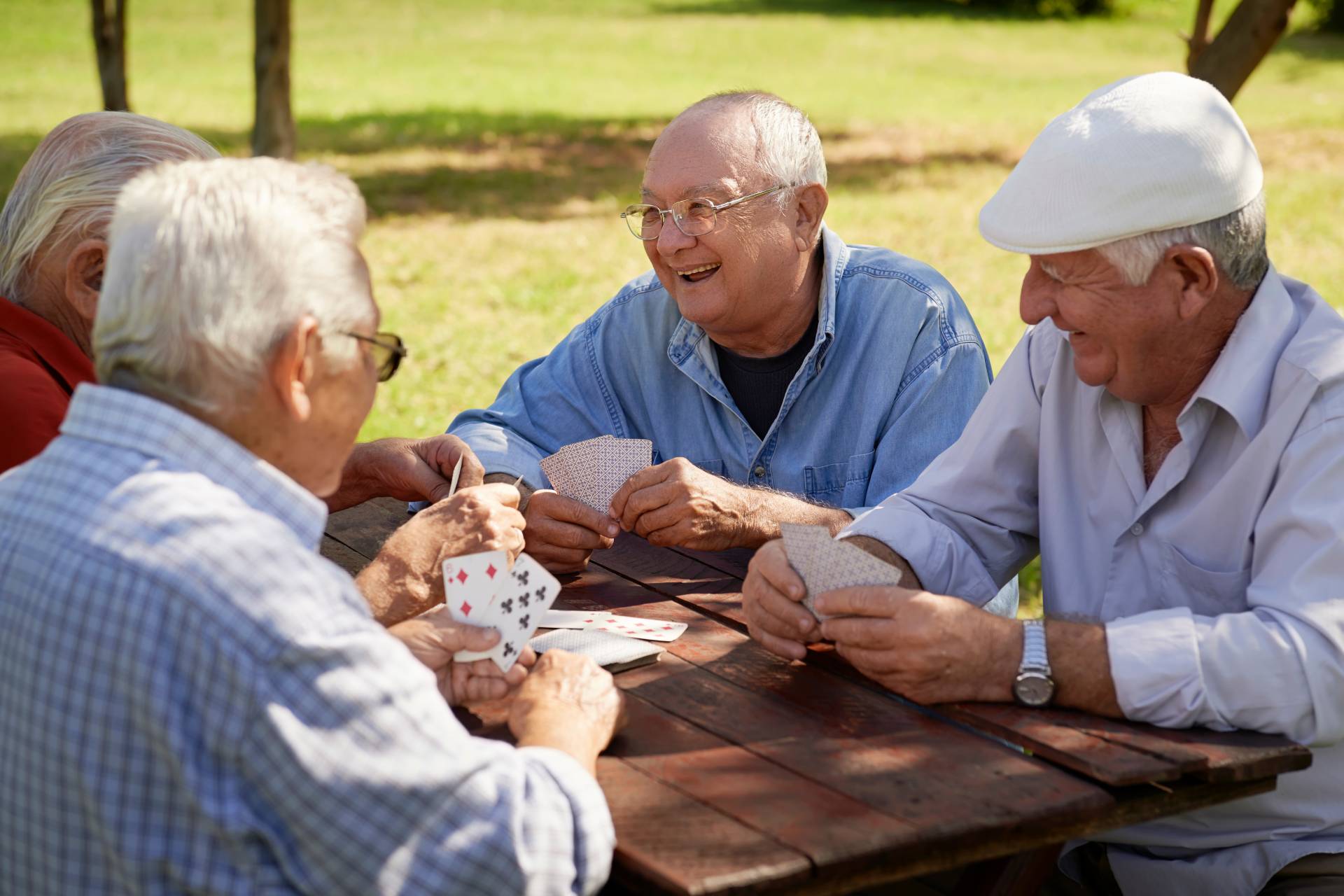Staying mentally sharp and engaged as you age doesn’t have to feel like work; it can be genuinely enjoyable! Whether you’re looking to challenge yourself with a new puzzle, reconnect with old hobbies, or discover exciting activities you’ve never tried before, there are countless ways to keep your brain active and thriving.
In this guide, we’ve gathered 31 engaging brain training games and activities specifically chosen for their ability to provide mental stimulation while bringing joy to your day. When you focus on brain games that truly interest you, they evolve beyond simple mental exercises to become powerful tools that enrich your daily life, foster social bonds, and provide new avenues for personal achievement.
Ready to explore new ways to keep your mind engaged and entertained? Let’s dive into why brain exercises are so beneficial and then discover the wide variety of activities that can help you stay mentally vibrant and engaged.
Why Are Brain Exercises For The Elderly So Important?
As we age, both our bodies and our brains undergo natural changes. Just as staying physically active helps maintain our strength and mobility, keeping our minds engaged through regular mental exercise is equally important for maintaining brain health and vitality.
The good news is that brain training doesn’t necessarily require expensive equipment or complicated routines. Here’s why incorporating these activities into your routine can make such a meaningful difference.
Connecting You With Loved Ones
Many brain games can naturally be played in group settings. Whether you’re playing games with grandchildren, working on a jigsaw puzzle with a spouse, or joining a book club with friends, these shared experiences create precious moments of connection while also keeping your mind active.
Exercising the Mind
Just as your body stays stronger with regular physical activity, your mind thrives when it’s regularly challenged and engaged. Keeping your brain active helps you maintain stronger memory abilities. That’s why mental exercises can be so effective, because they give your brain the regular workout it needs to stay sharp. When you tackle a crossword puzzle, learn a new card game, or learn a new language, you’re essentially taking your mind to the gym!
Making New Brain Connections
Your brain has an amazing ability to form new pathways and connections throughout your life during a process called neuroplasticity. When you engage in novel activities or learn new skills, you’re encouraging your brain to create these fresh neural pathways. These new connections can help your brain become more flexible and adaptable, supporting your cognitive health as you age.
Sharpening Cognitive Skills
Regular brain exercises can help fine-tune specific cognitive functions that you use throughout your day. Memory games can help you better remember names and faces, while strategy games can enhance your problem-solving abilities. Word games and language learning might improve your vocabulary and verbal skills, while number puzzles can keep your mathematical thinking sharp. These improvements often translate into feeling more confident and capable in everyday situations.
Improving Mental Health
Perhaps one of the most immediate benefits of brain games is how they can lift your spirits and boost your mood. The sense of accomplishment you feel when completing a challenging puzzle or mastering a new game can be incredibly satisfying. Many people find that engaging in mentally stimulating activities helps reduce feelings of boredom or restlessness, while providing a positive focus for their energy and attention.
31 Brain Training Games and Activities for Elderly Adults
Already know what type of activity you enjoy? Use the links below to jump ahead to that section:
- Word Games
- Number Games
- Board Games
- Three-dimensional (3D) video games
- Card Games
- Arts & Crafts
- Language Learning
- Puzzle Activities
- Books
- Trivia Games
Word Games

Word games offer a delightful way to exercise your mind while celebrating the vocabulary and language skills you’ve developed throughout your lifetime.
These brain training exercises help maintain verbal fluency, strengthen memory recall, and keep your communication abilities sharp. Best of all, most word brain games require minimal equipment and can be enjoyed anywhere, whether you prefer the traditional feel of pen and paper or the convenience of playing on a tablet or smartphone.
1. Boggle
This classic word-finding game challenges you to create as many words as possible from a grid of letters before the timer runs out. You can play the traditional board game version with family and friends, or try digital versions on your tablet or phone.
Boggle is excellent for improving pattern recognition and expanding your vocabulary, and the time pressure adds just enough excitement to keep things interesting.
2. Hangman
A timeless favourite that’s perfect for playing with grandchildren or friends, Hangman helps strengthen spelling skills and word recall. You can make it more challenging by choosing themed categories like “countries” or “favourite movies”. It’s a simple game that requires no special equipment—just paper, pencil, and a friend!
3. Crossword Puzzles
Perhaps the most beloved word game of all, crossword puzzles offer the perfect combination of vocabulary challenge and general knowledge testing.
Start with easier puzzles and gradually work your way up to more challenging ones. Many newspapers offer daily crosswords, and there are countless puzzle books and crossword apps available at different difficulty levels.
4. NYT Games
The New York Times Games collection includes the phenomenally popular Wordle, a daily word puzzle that has captured millions of players globally. Wordle challenges you to guess a five-letter word in six attempts, using clues from your previous guesses to narrow down the possibilities.
The NYT Games subscription also includes access to their famous crossword puzzles, Spelling Bee, and other engaging word games that provide daily brain games.
Number Games

Number games are excellent for improving concentration, logical thinking, and problem-solving skills while providing a satisfying mental challenge. The beauty of number games is that they offer clear, satisfying solutions, as there’s a definitive right answer waiting to be discovered through careful thought and patience.
5. Sudoku
This popular puzzle game has captured hearts worldwide, and for good reason.
Sudoku involves filling a 9×9 grid with numbers so that each row, column, and 3×3 box contains all digits from 1 to 9. Don’t worry if that sounds complicated; most Sudoku puzzles come with helpful instructions, and you can start with easier versions that have more numbers already filled in.
The beauty of Sudoku lies in its pure logic; you don’t need to be a math whiz, just patient and methodical. You can also find these puzzles in lots of newspapers and magazines, puzzle books, and Sudoku apps.
6. Minesweeper
This classic computer game is actually a fantastic logic puzzle that helps improve deductive reasoning.
The goal is to clear a minefield by clicking on safe squares while avoiding hidden mines. The numbers that appear give you clues about how many mines are nearby, helping you make logical deductions about where it’s safe to click next.
Minesweeper is available in app and web form, and the difficulty level can be adjusted to match your comfort zone.
Board Games

Playing board games offers the perfect blend of mental stimulation and social interaction. It encourages the development of various cognitive skills such as strategic thinking, planning, and memory retention while providing terrific opportunities to spend quality time with family and friends.
7. Chess
Chess is renowned for its ability to improve strategic thinking, pattern recognition, and planning skills. While it may seem intimidating if you’ve never played, it’s actually quite accessible once you learn the basic moves of each piece.
Many communities have chess clubs where beginners are welcome, and there are excellent online tutorials on YouTube that can teach you at your own pace.
The beauty of chess lies in how each game is completely different, providing endless mental challenges and opportunities for improvement.
8. Ticket to Ride
This delightful railway-themed game has become a modern classic for good reason.
Players collect train cards to claim railway routes across a map, connecting cities and completing destination tickets. Ticket to Ride combines strategy with just enough luck to keep things exciting, and games typically last about an hour.
9. Pegs and Jokers
This engaging card and board game is played with four to eight players and combines elements of strategy and luck. Using a few decks of cards and a board with holes and pegs, players race to move their pegs around the board and into their home spaces.
Pegs and Jokers encourages mathematical thinking as you calculate moves and plan strategies, and it’s particularly popular because it accommodates larger groups, making it ideal for family gatherings.
10. Bananagrams
Think of this as Scrabble’s fast-paced cousin! This word game requires no board; instead, each player uses letter tiles to build their own crossword grid as quickly as possible.
Bananagrams is fantastic for improving vocabulary, spelling, and quick thinking.
The portable yellow pouch makes it perfect for travel, and games typically last around 15-20 minutes.
Three-dimensional (3D) video games

That’s right. Playing video games isn’t just for young adults; seniors can enjoy it, too. These games can be wonderfully accessible and provide excellent mental exercise, in addition to improving reaction time, visual memory skills, spatial cognition, and overall executive functioning.
In fact, a study by Dr. Gregory West of the Université de Montréal suggests that playing 3D video games for just 30 minutes a day can help improve long-term memory and overall cognitive health.
According to Dr. West, this is likely because 3D video games help to engage the part of your brain responsible for memory and learning by encouraging it to create a cognitive map, or a mental representation, of whatever virtual environment you’re exploring in the game.
Make sure to check the reviews for games you may be interested in before purchasing in order to avoid frustration from challenging gameplay.
11. Wii Sports
This collection of sports games for the Nintendo Wii console combines gentle physical exercise with mental engagement, making it perfect for older adults.
The wireless controller allows you to play virtual tennis, bowling, golf, baseball, and boxing using simple, intuitive motions.
Wii Sports is excellent for hand-eye coordination, reaction time, strategic thinking, and it even offers a bit of a workout. Many retirement communities have Wii Sports tournaments because the games are so accessible.
12. Animal Crossing
This charming social simulation game lets you move to a peaceful virtual village where you’ll meet friendly animal residents, decorate your home, and complete daily tasks like gardening and fishing.
Animal Crossing encourages creative thinking, planning, and social interaction in a completely stress-free environment. There’s no pressure to compete or rush, and you can play at your own pace. It has become beloved by players of all ages for its therapeutic qualities.
This cozy game is available on your tablet as an app or on the Nintendo Switch.
13. Minecraft
While it might look like a children’s game, Minecraft is actually a sophisticated creative tool that’s perfect for exercising spatial reasoning and problem-solving skills. Think of it as digital building blocks where you can construct anything you can imagine—from simple houses to elaborate gardens or even replicas of real places.
The game encourages planning, creativity, and patience, and it can be played in a peaceful mode without any challenges or time pressure. Many grandparents enjoy building virtual versions of family homes or creating spaces to explore with grandchildren.
Minecraft can be played on any gaming device, including your tablet and computer.
Card Games

Card games are wonderfully versatile brain exercises that are perfect for improving memory, strategic thinking, and mathematical skills, while being portable enough to take anywhere.
14. UNO
This colourful and fast-paced card game has been bringing families together for decades.
UNO combines strategy with a touch of luck. Players try to be the first to play all their cards by matching colors or numbers.
The game helps improve strategic planning and decision-making, while the special action cards add excitement and keep everyone on their toes.
15. Solitaire
The perfect solo card game, Solitaire offers peaceful mental exercise whenever you want it.
Whether you play with physical cards or on a computer, Solitaire requires you to think several moves ahead while organizing cards in specific sequences. This provides excellent practice for logical thinking. Many people find the methodical nature of Solitaire to be meditative and relaxing, making it an ideal activity during alone time.
16. Cribbage
This traditional 2-4 person card game combines skill with just enough luck to keep things interesting.
Cribbage involves creating combinations of cards that add up to 15 or 31, along with sequences and pairs, while keeping track of points on a distinctive wooden board with holes. The game is excellent for mental arithmetic, memory, and improving your logic skills.
Many communities have cribbage groups where you can learn from experienced players and enjoy regular social games.
17. Wizard
This engaging trick-taking game challenges players to bid exactly how many tricks they think they’ll win each round.
Wizard requires careful observation of other players, memory of which cards have been played, and strategic thinking about when to play your high cards.
The game accommodates 3-6 players and provides excellent practice for strategic thinking. Each round brings new challenges as the number of cards dealt changes, keeping the game fresh and mentally stimulating.
Arts & Crafts

Creative activities provide a wonderful way to exercise your brain while producing something beautiful and meaningful.
Arts and crafts exercise multiple cognitive abilities simultaneously, from planning and problem-solving to fine motor coordination and colour recognition. Plus, you’ll have lovely finished pieces to gift to loved ones, or simply enjoy as tangible reminders of time well spent.
18. Paint-By-Numbers
This classic activity combines the joy of painting with the satisfaction of following a structured plan. Paint-by-numbers kits help improve focus and attention to detail while providing a relaxing, meditative experience.
As you carefully fill in each numbered section, you’re exercising fine motor skills and hand-eye coordination. The gradual revelation of the complete picture provides a wonderful sense of accomplishment
Modern kits come in a huge variety of subjects from landscapes and flowers to beloved pets and family photos that can be custom-made from your own pictures.
19. Crochet and Knitting
These traditional fibre arts are experiencing a wonderful renaissance, and for good reason! Both crochet and knitting provide excellent exercise for your hands and fingers while engaging your brain in pattern recognition, counting, and planning. The repetitive motions can be incredibly soothing, while working on more complex patterns challenges your memory and concentration.
Many communities have knitting circles or crochet groups where you can learn new techniques and enjoy social time, and there are lots of crochet and knitting tutorials available online to help you get started.
20. Punch Needling
This increasingly popular craft combines elements of embroidery and rug-making in a technique that’s both satisfying and accessible. Using a special punch needle tool, you create textured designs by pushing yarn or thread through fabric to form loops on the other side.
Punch needling is excellent for hand-eye coordination, and the technique is forgiving for beginners. You can create everything from small decorative pieces to larger wall hangings or pillow covers.
21. Rock Painting
This delightful outdoor craft encourages creativity while connecting you with nature. Rock painting involves finding smooth stones and transforming them into tiny works of art using acrylic paint markers or brushes.
This activity improves fine motor skills and allows for artistic expression while encouraging you to spend time outdoors searching for the perfect rocks.
Many rock painters use their work to decorate their gardens, while others hide their creations in parks and outdoor spaces for others to find, spreading joy throughout neighbourhoods.
Language Learning

Learning a new language or brushing up on one you studied years ago is one of the most powerful brain exercises available. Language learning engages multiple cognitive functions simultaneously—memory, attention, problem-solving, and pattern recognition—while opening doors to new cultures and experiences.
Don’t worry about achieving fluency; even basic language practice provides significant mental benefits and can be surprisingly enjoyable.
22. Language Learning Apps
Modern language learning apps like Duolingo, Memrise, and Busuu have revolutionized how we can learn languages, making the process more accessible and enjoyable than ever before. These apps break lessons into small, manageable chunks that you can complete in just 10-15 minutes a day.
Duolingo gamifies the learning process with points, streaks, and friendly competition, while Memrise uses memory techniques and real-world videos to help vocabulary stick. Busuu offers more structured courses with grammar explanations and conversation practice. All of these apps adapt to your learning pace and provide immediate feedback, helping you build confidence as you progress.
23. Watch a Show in a New Language
This approach to language learning lets you immerse yourself in a new language while being entertained by compelling stories and characters.
Start with shows in languages you are somewhat familiar with, using subtitles in your native language at first, then gradually switching to subtitles in the target language as your comprehension improves.
Streaming services offer content in dozens of languages, from Spanish telenovelas and French cooking shows to Italian travel documentaries and German mysteries. This method helps you absorb natural speech patterns, cultural context, and everyday vocabulary and slang in a relaxed, enjoyable way.
Puzzle Activities

Puzzles offer some of the purest forms of brain exercise, combining visual processing, logical thinking, and problem-solving in deeply satisfying ways.
Many people find solving puzzles to be wonderfully therapeutic, as it requires just enough focus to quiet everyday worries while providing a sense of progress and achievement.
24. Jigsaw Puzzles
Few activities are as timelessly satisfying as working on a jigsaw puzzle. As you sort pieces by colour, edge, and pattern, you’re exercising visual-spatial reasoning, attention to detail, and patience. For beginners, 100 to 500-piece puzzles provide the perfect challenge without being overwhelming.
You can choose images that resonate with you personally, whether that’s beautiful landscapes, favourite animals, famous artworks, or family photos that can be turned into custom puzzles.
25. Rubik’s Cube
This iconic 3D puzzle has captivated minds since the 70s! Don’t be intimidated if you’ve never solved one, there are excellent step-by-step tutorials available online, and many people find great satisfaction in learning the basic solution method.
Working with a Rubik’s Cube improves hand dexterity, pattern recognition, and sequential thinking as you learn to execute the series of moves needed to align all the colours. The cube is perfectly portable, making it an ideal activity for waiting rooms, travel, or any time you want a quick mental challenge.
Books

Reading remains one of the most comprehensive brain exercises available, engaging vocabulary, comprehension, memory, and imagination all at once.
Whether you’re diving into a thrilling mystery, exploring new ideas through non-fiction, or discussing books with others, reading provides rich mental stimulation while transporting you to different worlds and expanding your perspectives.
26. Fiction Books
Fiction offers the wonderful combination of entertainment and cognitive exercise by encouraging your brain to process complex narratives, remember character details, and make connections between plot points.
If you’re a fan of mystery novels, try Agatha Christie and Richard Osman. If contemporary fiction is more up your alley, then you’ll be sure to love authors like Frederik Backman and Matt Haig. For the history buffs, Kristin Hannah and Sue Monk Kidd write award-winning historical fiction that forefronts compelling personal stories against the backdrop of significant historical events, providing both entertainment and learning opportunities.
27. Non-Fiction Books
Non-fiction reading exercises your brain differently than fiction, challenging you to process factual information, learn new concepts, and often apply new skills and ideas to your own life.
Whether you’re interested in memoirs, history, science, or self-improvement, non-fiction books provide excellent cognitive stimulation while expanding your knowledge base.
Silvery Century offers a wonderful curated list of non-fiction books specifically chosen for older readers, covering everything from fascinating biographies to practical guides on how to best support an aging brain and pursue new hobbies.
28. Book Clubs With Guided Discussion Questions
Joining a book club transforms reading from a solitary activity into a rich social and intellectual experience. Book clubs provide excellent cognitive exercise as you are challenged to not only comprehend the material but also to analyze it, listen to different perspectives, and engage in meaningful discussions.
Many book clubs provide guided discussion questions that help you think more deeply about themes and character development, exercising critical thinking skills while building friendships around shared literary interests.
Trivia Games

Trivia games are fantastic for exercising your memory, general knowledge, and recall abilities while having fun with facts and information you’ve accumulated over the years. These games celebrate the wealth of knowledge you’ve gained through life experience, while also introducing you to new and interesting facts.
29. Trivial Pursuit
This classic board game has been bringing families and friends together for decades, challenging players to answer questions across six different categories:
- Geography
- Entertainment
- History
- Arts & Literature
- Science & Nature
- Sports & Leisure
The game often sparks discussions about past events and interesting facts, making it as much about sharing memories and stories as it is about answering questions correctly. With various editions available, from classic to themed versions, there’s a version for everyone.
30. Trivia Crack App
This popular mobile app brings classic trivia into the digital age with colourful graphics, engaging gameplay, and the ability to challenge friends and family members remotely and at your own pace.
Trivia Crack covers six categories similar to traditional trivia games but presents questions in a modern, interactive format. The app allows you to play against people you know or be matched with players from around the world, adding a social element even when you’re playing alone.
31. Britannica Daily Trivia Games
The renowned Encyclopedia Britannica offers daily trivia games on its website, providing high-quality questions that cover a wide range of educational topics.
These online trivia challenges are perfect for exercising your brain while learning new facts from a trusted source. The questions are well-researched and often include interesting explanations that expand your understanding of the topics covered.
Keeping Your Aging Brain Healthy
Incorporating cognitively stimulating activities into your daily routine is one of the most enjoyable ways to support your brain’s health as you age. The key to success is finding activities that genuinely interest you and fit naturally into your lifestyle.
You don’t need to tackle every activity on this list—choose a few that spark your curiosity and start there. Perhaps start your day with a crossword puzzle, enjoy an afternoon of crocheting or playing your favourite video game, or wind down with a good book or jigsaw puzzle before bed. Remember, consistency matters more than intensity. Even 15-20 minutes of mental exercise a few times a week can make a meaningful difference in keeping your mind sharp and engaged long-term.
Don’t forget that the social aspects of many of these activities are just as important as the mental exercise. Playing games with family and friends, joining a book club, or participating in group activities provides emotional benefits that support overall brain health. The laughter, conversation, and connection that come with shared activities contribute significantly to your mental health.
Most importantly, be patient with yourself as you try new activities. Every expert was once a beginner, and the joy lies in the learning process itself. Whether you’re rediscovering an old passion or exploring something completely new, you’re taking positive steps toward maintaining a vibrant mind.
Your brain has served you well throughout your life, and it’s completely natural to experience cognitive changes as you age. With regular mental exercise, you can help your brain continue to be a source of curiosity, creativity, and joy for years to come.
Support for Your Brain Training Journey
At Ohana Care, we understand that staying mentally engaged is a vital part of healthy aging. Our compassionate Health Care Aides and Licensed Practical Nurses are here to support you in maintaining an active, fulfilling lifestyle that includes the cognitive activities you enjoy most.
If you’re interested in learning more about how our in-home care services can support your cognitive health and overall well-being, we’d love to hear from you. Contact us today to discover how we can help you maintain your independence and continue participating in the activities that matter most to you, right in the comfort of your own home.





